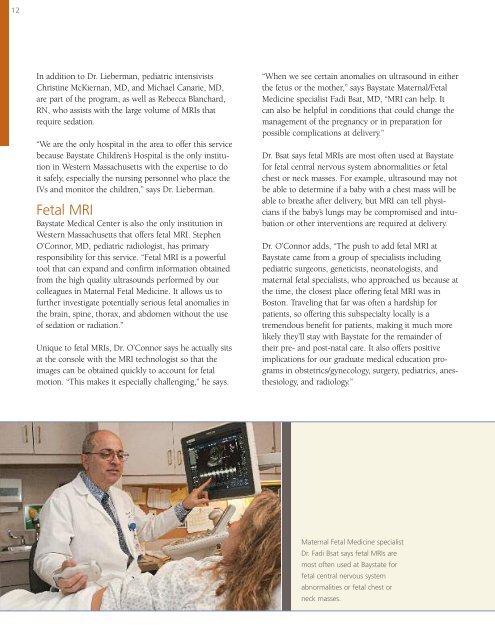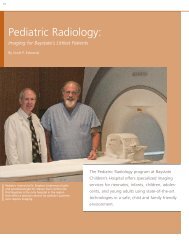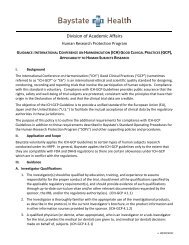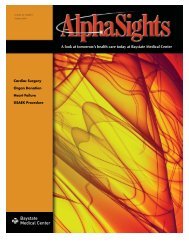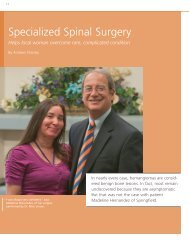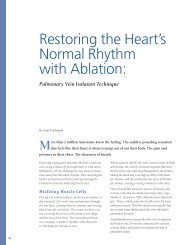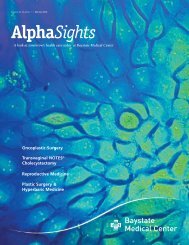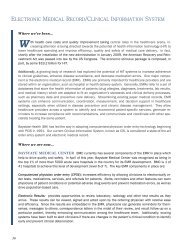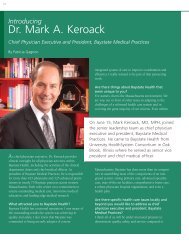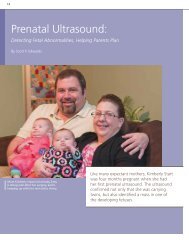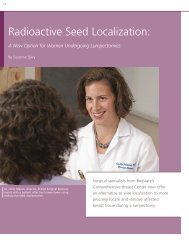Al Pha Sights - Baystate Health
Al Pha Sights - Baystate Health
Al Pha Sights - Baystate Health
Create successful ePaper yourself
Turn your PDF publications into a flip-book with our unique Google optimized e-Paper software.
12<br />
In addition to Dr. Lieberman, pediatric intensivists<br />
Christine McKiernan, MD, and Michael Canarie, MD,<br />
are part of the program, as well as Rebecca Blanchard,<br />
RN, who assists with the large volume of MRIs that<br />
require sedation.<br />
“We are the only hospital in the area to offer this service<br />
because <strong>Baystate</strong> Children’s Hospital is the only institution<br />
in Western Massachusetts with the expertise to do<br />
it safely, especially the nursing personnel who place the<br />
IVs and monitor the children,” says Dr. Lieberman.<br />
Fetal MRI<br />
<strong>Baystate</strong> Medical Center is also the only institution in<br />
Western Massachusetts that offers fetal MRI. Stephen<br />
O’Connor, MD, pediatric radiologist, has primary<br />
responsibility for this service. “Fetal MRI is a powerful<br />
tool that can expand and confirm information obtained<br />
from the high quality ultrasounds performed by our<br />
colleagues in Maternal Fetal Medicine. It allows us to<br />
further investigate potentially serious fetal anomalies in<br />
the brain, spine, thorax, and abdomen without the use<br />
of sedation or radiation.”<br />
Unique to fetal MRIs, Dr. O’Connor says he actually sits<br />
at the console with the MRI technologist so that the<br />
images can be obtained quickly to account for fetal<br />
motion. “This makes it especially challenging,” he says.<br />
“When we see certain anomalies on ultrasound in either<br />
the fetus or the mother,” says <strong>Baystate</strong> Maternal/Fetal<br />
Medicine specialist Fadi Bsat, MD, “MRI can help. It<br />
can also be helpful in conditions that could change the<br />
management of the pregnancy or in preparation for<br />
possible complications at delivery.”<br />
Dr. Bsat says fetal MRIs are most often used at <strong>Baystate</strong><br />
for fetal central nervous system abnormalities or fetal<br />
chest or neck masses. For example, ultrasound may not<br />
be able to determine if a baby with a chest mass will be<br />
able to breathe after delivery, but MRI can tell physicians<br />
if the baby’s lungs may be compromised and intubation<br />
or other interventions are required at delivery.<br />
Dr. O’Connor adds, “The push to add fetal MRI at<br />
<strong>Baystate</strong> came from a group of specialists including<br />
pediatric surgeons, geneticists, neonatologists, and<br />
maternal fetal specialists, who approached us because at<br />
the time, the closest place offering fetal MRI was in<br />
Boston. Traveling that far was often a hardship for<br />
patients, so offering this subspecialty locally is a<br />
tremendous benefit for patients, making it much more<br />
likely they’ll stay with <strong>Baystate</strong> for the remainder of<br />
their pre- and post-natal care. It also offers positive<br />
implications for our graduate medical education programs<br />
in obstetrics/gynecology, surgery, pediatrics, anesthesiology,<br />
and radiology.”<br />
Maternal Fetal Medicine specialist<br />
Dr. Fadi Bsat says fetal MRIs are<br />
most often used at <strong>Baystate</strong> for<br />
fetal central nervous system<br />
abnormalities or fetal chest or<br />
neck masses.


